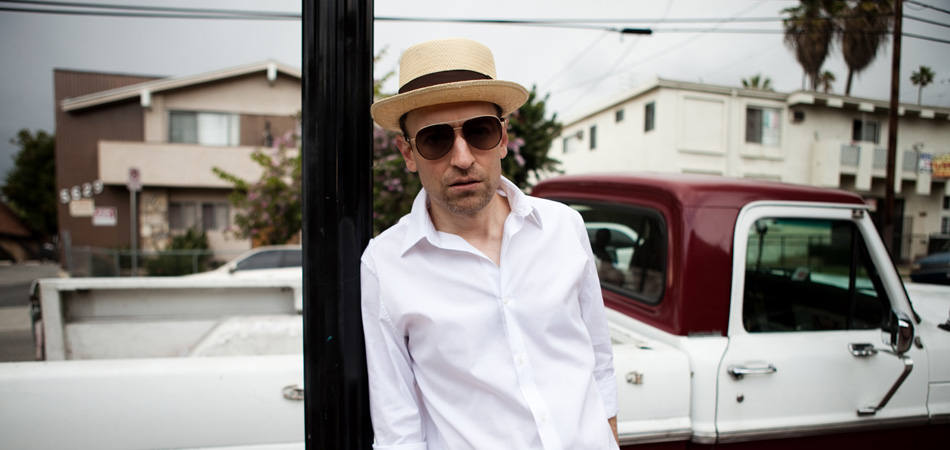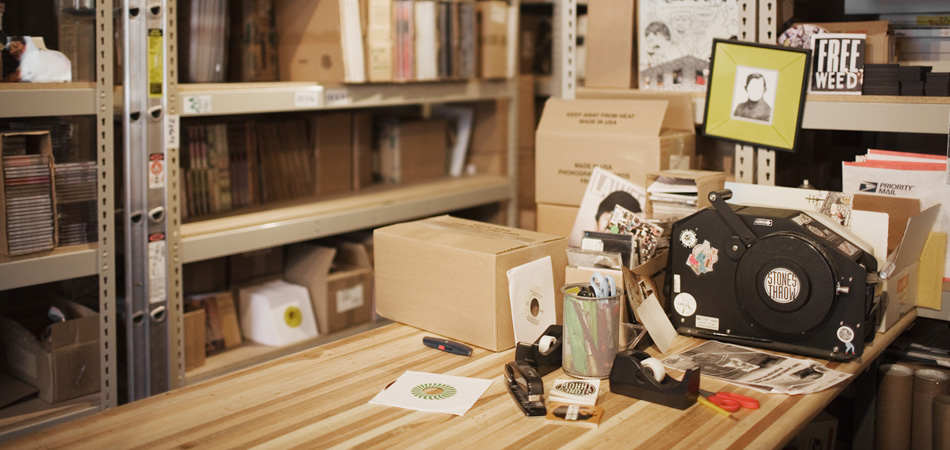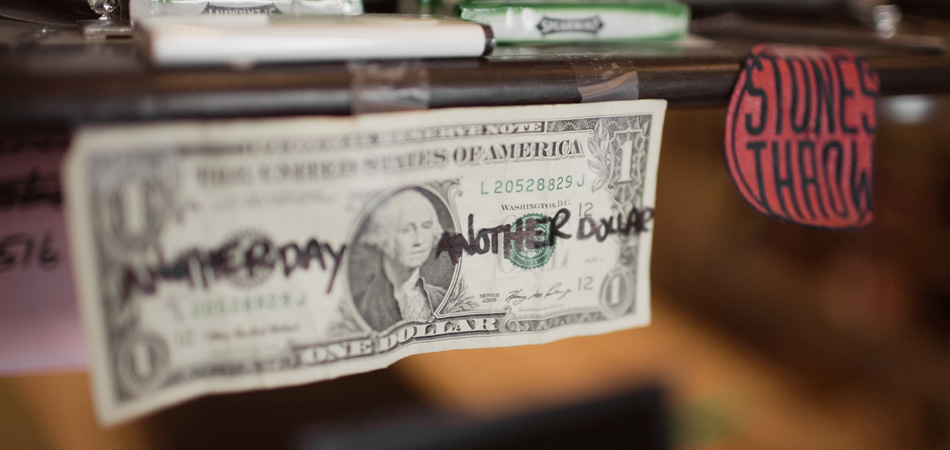Peanut Butter Wolf: Bridging Vinyl & Digital
Not relying on prototypical marketing tactics, Stones Throw has creatively released original music touching the pulse of our era. We sat down with label head Peanut Butter Wolf to discuss the complex issue of the modern music industry, the story behind his label, and much more.

The musical realm has endured difficult times over the past decade and has become a well-documented aspect of the industry. While so-called “new media” is providing an easier and faster access to current music, the Internet has also imposed a heavy challenge on record labels. Despite the fact recording artists have found new possibilities to communicate with their fans more efficiently, there seems to be a complicated line between supply and demand. Early leaks and illegal downloads have grown into a serious problem for the revenue of corporate brands. While fighting for an appropriate balance between commercial success and artistic credibility, major labels seem to be driven out of their comfort zone. Bad strategic decisions and miscommunication are sometimes an unfortunate consequence.
One perfect example of coping with these new digital circumstances in an adequate way comes in the shape of Stones Throw Records. Led by Chris Manak, more commonly known as Peanut Butter Wolf, the label understands the ways of new media without going astray with its philosophy. Initially dedicated to hardcore collectors and DJs, the label has found a strong following due to its authentic material. Not relying on prototypical marketing tactics, Stones Throw released creatively original music thus touching the pulse of our era. The success of artists like Aloe Blacc, Madlib or Mayer Hawthorne reinforce this notion.
We sat down with label head Peanut Butter Wolf to discuss the complex issue of the modern music industry, the story behind his label and much more.
Interview: Petar Kujundzic
Photography: John Henry Baliton (Office) / Jeremy Deputat (Portrait)

Thanks for your time. Could you tell us a little about Stones Throw as a record label in general – from the early stages until now?
The earliest stage of my record label dreams was PMR Records. That’s a label I started with 2 friends in 1990 using a loan from my dad. We put out one vinyl 12” single and it flopped. After that, I went more of the artist route, making beats and DJing for Charizma until he passed away in 1993. My second “attempt” at a record label was in 1994 with my own release Peanut Butter Breaks under a label I started called “Heyday Records” also in San Jose. I had someone else handling all the business, but the phone number on the record was actually my pager number. Little did I know, there was already another Heyday Records. This one was more of a “success” in that my record got distributed all over the world and was repressed several times, but Heyday was more of an imprint under someone else’s label. In 1995, I spent a lot of time doing compilations, remixes, and producing for other artists.
In 1996 I decided to start Stones Throw in San Francisco. The first few years were just me as far as staff goes and I did vinyl only. Stones Throw was strictly a label for DJs and hardcore collectors. I didn’t care about the average person who was a casual music listener. About a year or two after starting the label I “discovered” Lootpack and Madlib also known as Quasimoto and the label took a turn. I felt really confident about the way things were going and moved to LA to be closer to Madlib. I hired 2 more guys (Egon and Jeff Jank) and offered them nothing more than a place to stay at first, but eventually, things worked out. Egon had just graduated college, but he had a lot of drive and was personable and smart, so I wasn’t worried. Jeff Jank was very self motivated and talented. He thought outside the box with the visuals.
Through the years, it’s kind of been the same at the core. Find artists I like, don’t think too hard about anything, and go along for the ride that God takes me on. When I first started working with Dilla, he told me he was gonna take me on a ride too and he did.
What is the philosophy behind the label itself and your releases?
Don’t let money or what your perception is in people’s eyes overly influence your decisions or hold you back from doing what you wanna do.
You have an impressive range of diverse artists that also seem to complement each other from Mayer Hawthorne to James Pants. Do you have any special approach to select artists for your roster? Could you also expand on your artist catalogue.
It all comes down to the songs with me. When I first was interested in Mayer Hawthorne, it was despite the fact that he was doing 60’s and 70’s throwback music. On paper he was a “blue eyed soulful Motown/Stax sounding artist”, I would’ve never signed him. But I looked past all that because I liked his writing and his songs. His songs were so good, they gave me an appreciation for an era of music that I wasn’t even that big on. I didn’t even like Northern Soul back when everyone else was liking it. That’s how I feel about Vex Ruffin right now as well. I wasn’t looking for a rock act to sign or even into much new rock, but I came across it and loved it. I’m sure people will criticize me again and get on the Stones Throw message board and say “Wolf, where’s the Hip-Hop?” like they’ve been doing for the past several years and I understand their frustration because there aren’t many labels left putting out the music they’re fiending for, but I grew up listening to lots of different stuff and that’s how I like to look at Stones Throw. Several years ago, the head of my distributor told me, “you should be careful with putting out rock because we had a rock label try to put out Hip-Hop and it didn’t work”. I appreciated the advice, but didn’t take it because I’d rather fail doing something I love than succeed doing something I hate.

As a former full-time recording artist you run an independent label focused on underground Hip-Hop music. In what aspect do you think your view differs on the industry from others in your position that have a more, let’s say business-oriented background.
Stones Throw started in the mid 90’s out of the Silicon Valley. We started when and where the Internet started. People like Jeff Jank paid close attention to the marketing trends and more importantly started his own. The only way I’m not necessarily business minded is in my signings. I’ve had arguments with members of my staff (sometimes all of them against me at the same time), where I flat out refused to put out an artist because I didn’t like the music. I don’t care how big the buzz is on someone. If I don’t like it, lo siento.
It is hard to imagine that someone who has an artistic background abandons his creative roots for good. You still DJ and produce videos every now and then. How does your responsibilities as head of Stones Throw Records affect your creative output?
My job is almost 100% creative. I work closely with the artists, work in the studio, video stuff (like you mention), artwork ideas, you name it. I did my own record cover for “My Vinyl Weighs A Ton” and still do stuff like that when I feel like it too. I’ve actually slowed down on DJing again even though I get more offers now than I did then because the label work has been more fulfilling. Little things I see remind me that we’re appreciated, even though we don’t win major awards or get a ton of mainstream support.
You mention that Stones Throw was strictly a label for DJs and hard core collectors”. As the label gets bigger and bigger, has it become difficult to maintain your vision? Is there not a middle road between creativity and commercial success?
Well, part of our business has ironically gone back to being for the “hardcore collectors” and those are some of my favorite releases. Check out Precious & Passion or Tony Cook. I’m glad to be able to continue to do those types of things, regardless of how much they sell. The Internet has just allowed some of our artists to get their music out there without the constraints they used to have due to radio and TV. The venues that book them all over the world and the people come out and pay money to see them live attest to that. I don’t personally strive for commercial success, but I strive for success. Honestly, our fans take pride in the fact that they found us WITHOUT getting it spoonfed to them on the radio.

Creativity and money seem to be able to coexist since some of your artists have the potential to become a constant threat for the charts. Mayer Hawthorne’s momentum on the global musical scene can’t be denied. Aloe Blacc’s new single “I Need A Dollar” is the theme song for HBO’s “How To Make It in America” thus having become the new “Hustler’s Anthem” of the year. This seems to be a rather unusual turn for an independent label. Could you explain how these latest developments affect your daily business and what does it signify for the label’s future moves?
These types of things reassure me that there’s others out there who stick their neck out for us. The music supervisor for HBO took a huge chance with giving the theme song of Mark Walberg’s latest TV show to a more or less unknown artist on an indie label. And Mayer was our FIRST artist to make it to national TV on a major network and they gave him a shot when he was still unknown to the general public. When our publicist first told us LA Weekly was gonna give us the cover of their magazine, I didn’t believe it would happen because I’ve struggled for so many years with very little fanfare in terms of the label, but they took a chance on us too. But a simple twitter message from someone or handshake at a show is as fulfilling for me personally. If I weren’t doing this, I’d be in trouble cause I never made a plan B.
Do you feel that the gap between major labels and independent labels is becoming smaller?
Of course it is. Because the music industry went upside down, so things that worked for the past 30 years don’t work anymore. I’ve sat in more meetings with heads of major labels this year than I have in all the other previous years of Stones Throw combined. If these major label guys knew better, they’d try to hire me to do A & R for them. All the coolest artists come to me to release their music now. I don’t even have to work at that part of it anymore.
More authenticity and originality is in high demands among music lovers these days. How would you explain this recent development?
The radio is less powerful and the Internet is more powerful. It’s cool to be yourself these days.

With Stones Throw’s great tradition of vinyls and packaging of records how do you balance this style in the digital era?
When designing a record cover, you used to have to take into account what it would look like as 12 inches (vinyl) and what it would look like as 5 inches (CD), now you have to also take into account what it will look like 2 inches (iTunes thumbnail). Or just say, “screw it. I only care about what will look best at 12 inches.”
What is your perception of the Internet as far as running an independent label is concerned. It seems that the music industry is still looking for a way to manage adequately the changing circumstances.
The Internet is our friend and our enemy. If things continue the way they’re currently going, CDs will be gone, most music will be only digital and thousands of labels will be competing for the attention of that one main online store. And it’s definitely a trip how much the consumer’s mind state about music shifted with this generation. Recorded music is to be downloaded for free. Live music is to be paid for. Most labels have to be in the merchandise, touring and licensing business these days just to stay alive. We’re lucky because our fans are die-hards and will actually buy physical goods from us.
Having all these aforementioned aspects in mind how would you specify Stones Throw’s evolution?
Natural.
